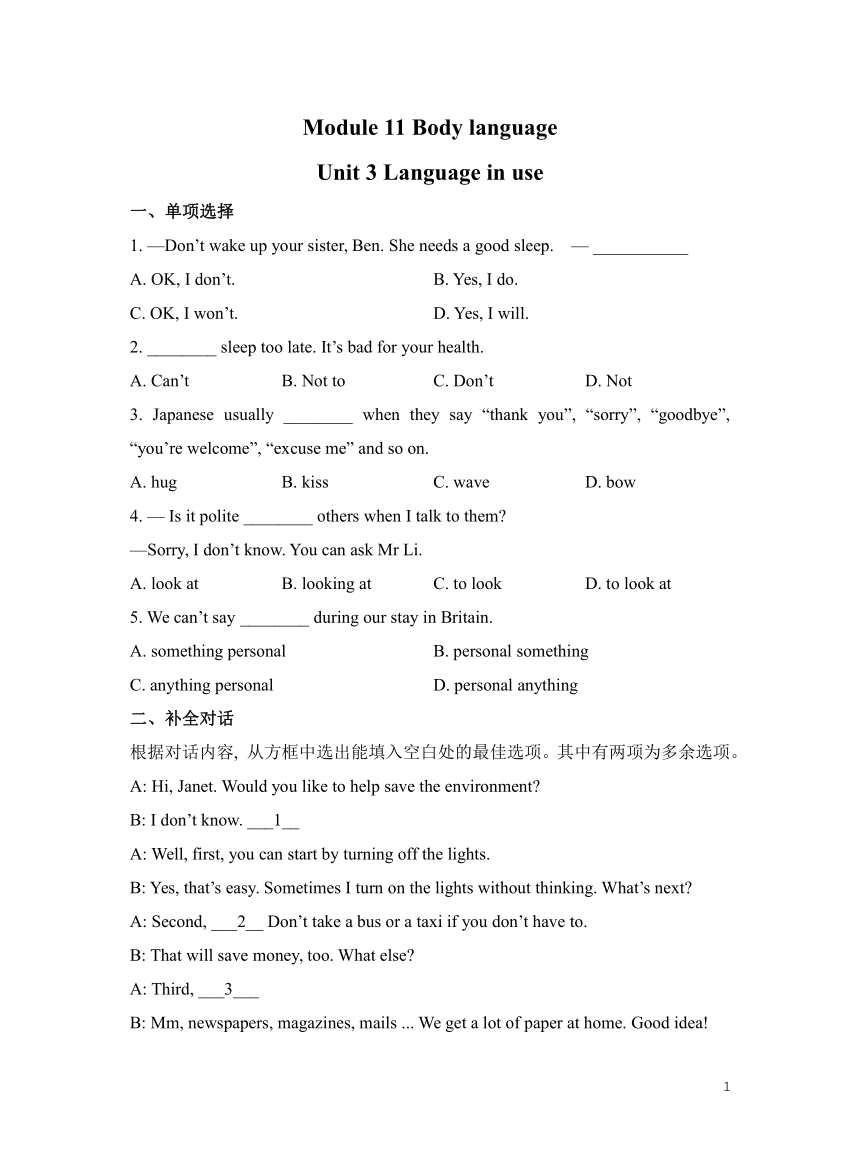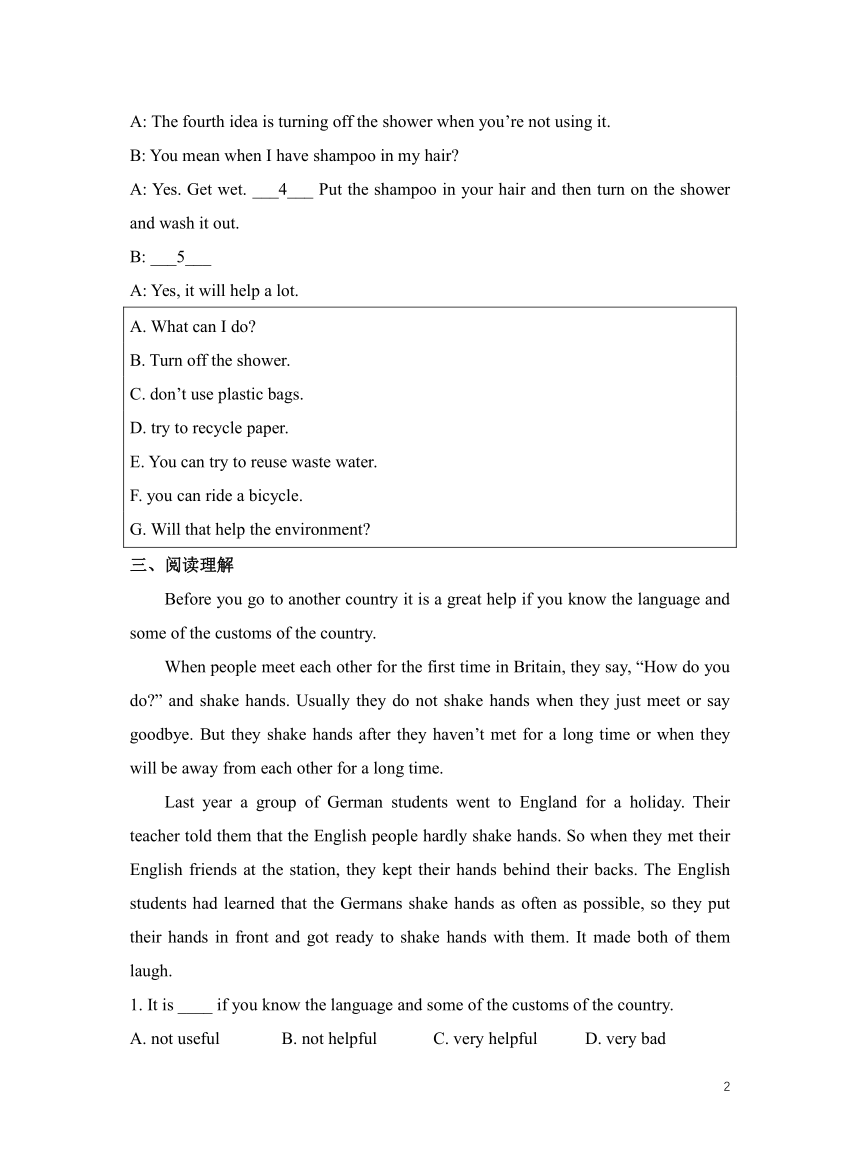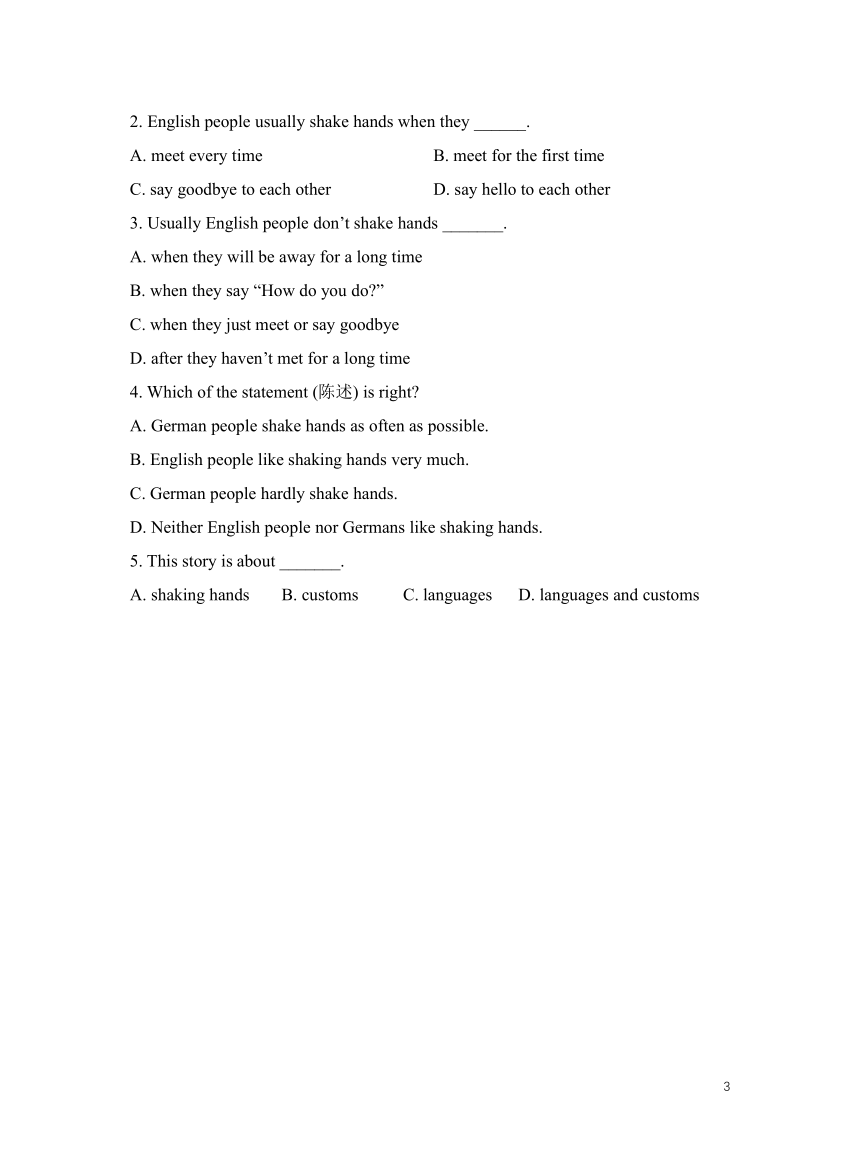初中英语外研版七下Module11 Body language.Unit 3 Language in use作业(含解析)
文档属性
| 名称 | 初中英语外研版七下Module11 Body language.Unit 3 Language in use作业(含解析) |

|
|
| 格式 | docx | ||
| 文件大小 | 17.6KB | ||
| 资源类型 | 教案 | ||
| 版本资源 | 外研版 | ||
| 科目 | 英语 | ||
| 更新时间 | 2023-08-30 16:38:11 | ||
图片预览



文档简介
Module 11 Body language
Unit 3 Language in use
一、单项选择
1. —Don’t wake up your sister, Ben. She needs a good sleep. — ___________
A. OK, I don’t. B. Yes, I do.
C. OK, I won’t. D. Yes, I will.
2. ________ sleep too late. It’s bad for your health.
A. Can’t B. Not to C. Don’t D. Not
3. Japanese usually ________ when they say “thank you”, “sorry”, “goodbye”, “you’re welcome”, “excuse me” and so on.
A. hug B. kiss C. wave D. bow
4. — Is it polite ________ others when I talk to them
—Sorry, I don’t know. You can ask Mr Li.
A. look at B. looking at C. to look D. to look at
5. We can’t say ________ during our stay in Britain.
A. something personal B. personal something
C. anything personal D. personal anything
二、补全对话
根据对话内容, 从方框中选出能填入空白处的最佳选项。其中有两项为多余选项。
A: Hi, Janet. Would you like to help save the environment
B: I don’t know. ___1__
A: Well, first, you can start by turning off the lights.
B: Yes, that’s easy. Sometimes I turn on the lights without thinking. What’s next
A: Second, ___2__ Don’t take a bus or a taxi if you don’t have to.
B: That will save money, too. What else
A: Third, ___3___
B: Mm, newspapers, magazines, mails ... We get a lot of paper at home. Good idea!
A: The fourth idea is turning off the shower when you’re not using it.
B: You mean when I have shampoo in my hair
A: Yes. Get wet. ___4___ Put the shampoo in your hair and then turn on the shower and wash it out.
B: ___5___
A: Yes, it will help a lot.
A. What can I do
B. Turn off the shower.
C. don’t use plastic bags.
D. try to recycle paper.
E. You can try to reuse waste water.
F. you can ride a bicycle.
G. Will that help the environment
三、阅读理解
Before you go to another country it is a great help if you know the language and some of the customs of the country.
When people meet each other for the first time in Britain, they say, “How do you do ” and shake hands. Usually they do not shake hands when they just meet or say goodbye. But they shake hands after they haven’t met for a long time or when they will be away from each other for a long time.
Last year a group of German students went to England for a holiday. Their teacher told them that the English people hardly shake hands. So when they met their English friends at the station, they kept their hands behind their backs. The English students had learned that the Germans shake hands as often as possible, so they put their hands in front and got ready to shake hands with them. It made both of them laugh.
1. It is ____ if you know the language and some of the customs of the country.
A. not useful B. not helpful C. very helpful D. very bad
2. English people usually shake hands when they ______.
A. meet every time B. meet for the first time
C. say goodbye to each other D. say hello to each other
3. Usually English people don’t shake hands _______.
A. when they will be away for a long time
B. when they say “How do you do ”
C. when they just meet or say goodbye
D. after they haven’t met for a long time
4. Which of the statement (陈述) is right
A. German people shake hands as often as possible.
B. English people like shaking hands very much.
C. German people hardly shake hands.
D. Neither English people nor Germans like shaking hands.
5. This story is about _______.
A. shaking hands B. customs C. languages D. languages and customs
参考答案与解析
一、单项选择
1. C
【解析】句意:——本,不要喊醒你的妹妹。她需要好好睡一觉。——好的,我不会的。对于祈使句的回答,肯定形式用I will. 否定回答用I won’t. 故选C。
2. C
【解析】句意:不要睡得太晚。它对你的健康有害。
考查祈使句。根据It’s bad for your health.它对你的健康有害。可知句意是:不要睡得太晚。句子结构是否定祈使句,否定的祈使句以“Don’t +动词原形”开头,故答案选C。
3. D
【解析】句意:日本人在说“谢谢”、“对不起”、“再见”、“不客气”、“对不起”等时,他们通常鞠躬。
考查动词辨析。hug拥抱;kiss亲吻;wave挥手;bow鞠躬。结合语境:当日本人说“谢谢”、“对不起”、“再见”、“不客气”、“对不起”等时,他们通常___。由日本的习俗可知是“鞠躬”,故答案选D。
4. D
【解析】句意:——当我和其他人交谈时,看着他们是礼貌的吗?——对不起,我不知道。你可以问问李先生。
look at是动词原形,looking at是现在分词,to look是动词不定式,是不及物动词,to look at是动词不定式,是及物动词短语;此处接宾语others,故用及物动词短语look at,故排除C项。根据句型It is polite to do sth.“做某事是礼貌的”,it是形式主语,to do sth.是真正主语。故选D。
5. C
【解析】句意:在英国逗留期间,我们不能说任何私人的事情。
考查不定代词。something和anything都是不定代词,something一般用在肯定句中,anything 一般用在否定句和疑问句中。本句通过can’t可知是否定句,故使用anything,排除A、B选项;personal个人的、私人的,形容词,形容词修饰不定代词,要放在不定代词的后面,排除D选项;故答案选C。
二、补全对话
【解析】本文是A和Janet的一段对话。A问Janet是否愿意帮助拯救环境,Janet说自己不知道能为保护环境做什么,然后A告诉了她一些如何保护环境的方法、策略。
1. A
根据下文Well, first, you can start by turning off the lights. 嗯,首先,你可以从关灯开始。可知,此处是在询问我能做什么呢,结合选项可知A选项What can I do 我能做什么 符合语境,故答案选A。
2. F
根据下文Don’t take a bus or a taxi if you don’t have to.如果没有必要,不要乘坐公共汽车或出租车。可知,此处应是建议选择环保的出行方式,结合选项可知F选项you can ride a bicycle你可以骑自行车符合语境,故答案选F。
3. D
根据下文Mm, newspapers, magazines, mails ... We get a lot of paper at home. 嗯,报纸、杂志、邮件……我们家里有很多纸。可知,这项环保建议跟纸有关,结合选项可知D选项try to recycle paper尽量回收纸张符合语境,故答案选D。
4. B
根据下文Put the shampoo in your hair and then turn on the shower and wash it out.把洗发水喷在头发上,然后打开淋浴器把它洗掉。可知,抹洗发水的时候要关掉淋浴,结合选项可知B选项Turn off the shower关掉淋浴符合语境,故答案选B。
5. G
根据下文Yes, it will help a lot.是的,它会有很大帮助。可知,此处是问这么做对环境是否有帮助。结合选项可知G选项Will that help the environment 这样就有助于保护环境吗?符合语境,故答案选G。
三、阅读理解
1. C
根据文章内容Before you go to another country it is a great help if you know the language and some of the customs of the country. 可知是非常有帮助的;故选C。
2. B
根据文章内容,When people meet each other for the first time in Britain, they say, “How do you do ” and shake hands.可知是英国人第一次见面时握手;故选B。
3. C
根据文章内容Usually they do not shake hands when they just meet or say goodbye可知当他们正好遇到或再见时不握手;故选C。
4. A
根据文章the Germans shake hands as often as possible可知德国人尽可能经常的握手;故选A。
5. D
根据Before you go to another country it is a great help if you know the language and some of the customs of the country.和文章内容,可知是介绍语言与风俗习惯的文章;故选D。
1
Unit 3 Language in use
一、单项选择
1. —Don’t wake up your sister, Ben. She needs a good sleep. — ___________
A. OK, I don’t. B. Yes, I do.
C. OK, I won’t. D. Yes, I will.
2. ________ sleep too late. It’s bad for your health.
A. Can’t B. Not to C. Don’t D. Not
3. Japanese usually ________ when they say “thank you”, “sorry”, “goodbye”, “you’re welcome”, “excuse me” and so on.
A. hug B. kiss C. wave D. bow
4. — Is it polite ________ others when I talk to them
—Sorry, I don’t know. You can ask Mr Li.
A. look at B. looking at C. to look D. to look at
5. We can’t say ________ during our stay in Britain.
A. something personal B. personal something
C. anything personal D. personal anything
二、补全对话
根据对话内容, 从方框中选出能填入空白处的最佳选项。其中有两项为多余选项。
A: Hi, Janet. Would you like to help save the environment
B: I don’t know. ___1__
A: Well, first, you can start by turning off the lights.
B: Yes, that’s easy. Sometimes I turn on the lights without thinking. What’s next
A: Second, ___2__ Don’t take a bus or a taxi if you don’t have to.
B: That will save money, too. What else
A: Third, ___3___
B: Mm, newspapers, magazines, mails ... We get a lot of paper at home. Good idea!
A: The fourth idea is turning off the shower when you’re not using it.
B: You mean when I have shampoo in my hair
A: Yes. Get wet. ___4___ Put the shampoo in your hair and then turn on the shower and wash it out.
B: ___5___
A: Yes, it will help a lot.
A. What can I do
B. Turn off the shower.
C. don’t use plastic bags.
D. try to recycle paper.
E. You can try to reuse waste water.
F. you can ride a bicycle.
G. Will that help the environment
三、阅读理解
Before you go to another country it is a great help if you know the language and some of the customs of the country.
When people meet each other for the first time in Britain, they say, “How do you do ” and shake hands. Usually they do not shake hands when they just meet or say goodbye. But they shake hands after they haven’t met for a long time or when they will be away from each other for a long time.
Last year a group of German students went to England for a holiday. Their teacher told them that the English people hardly shake hands. So when they met their English friends at the station, they kept their hands behind their backs. The English students had learned that the Germans shake hands as often as possible, so they put their hands in front and got ready to shake hands with them. It made both of them laugh.
1. It is ____ if you know the language and some of the customs of the country.
A. not useful B. not helpful C. very helpful D. very bad
2. English people usually shake hands when they ______.
A. meet every time B. meet for the first time
C. say goodbye to each other D. say hello to each other
3. Usually English people don’t shake hands _______.
A. when they will be away for a long time
B. when they say “How do you do ”
C. when they just meet or say goodbye
D. after they haven’t met for a long time
4. Which of the statement (陈述) is right
A. German people shake hands as often as possible.
B. English people like shaking hands very much.
C. German people hardly shake hands.
D. Neither English people nor Germans like shaking hands.
5. This story is about _______.
A. shaking hands B. customs C. languages D. languages and customs
参考答案与解析
一、单项选择
1. C
【解析】句意:——本,不要喊醒你的妹妹。她需要好好睡一觉。——好的,我不会的。对于祈使句的回答,肯定形式用I will. 否定回答用I won’t. 故选C。
2. C
【解析】句意:不要睡得太晚。它对你的健康有害。
考查祈使句。根据It’s bad for your health.它对你的健康有害。可知句意是:不要睡得太晚。句子结构是否定祈使句,否定的祈使句以“Don’t +动词原形”开头,故答案选C。
3. D
【解析】句意:日本人在说“谢谢”、“对不起”、“再见”、“不客气”、“对不起”等时,他们通常鞠躬。
考查动词辨析。hug拥抱;kiss亲吻;wave挥手;bow鞠躬。结合语境:当日本人说“谢谢”、“对不起”、“再见”、“不客气”、“对不起”等时,他们通常___。由日本的习俗可知是“鞠躬”,故答案选D。
4. D
【解析】句意:——当我和其他人交谈时,看着他们是礼貌的吗?——对不起,我不知道。你可以问问李先生。
look at是动词原形,looking at是现在分词,to look是动词不定式,是不及物动词,to look at是动词不定式,是及物动词短语;此处接宾语others,故用及物动词短语look at,故排除C项。根据句型It is polite to do sth.“做某事是礼貌的”,it是形式主语,to do sth.是真正主语。故选D。
5. C
【解析】句意:在英国逗留期间,我们不能说任何私人的事情。
考查不定代词。something和anything都是不定代词,something一般用在肯定句中,anything 一般用在否定句和疑问句中。本句通过can’t可知是否定句,故使用anything,排除A、B选项;personal个人的、私人的,形容词,形容词修饰不定代词,要放在不定代词的后面,排除D选项;故答案选C。
二、补全对话
【解析】本文是A和Janet的一段对话。A问Janet是否愿意帮助拯救环境,Janet说自己不知道能为保护环境做什么,然后A告诉了她一些如何保护环境的方法、策略。
1. A
根据下文Well, first, you can start by turning off the lights. 嗯,首先,你可以从关灯开始。可知,此处是在询问我能做什么呢,结合选项可知A选项What can I do 我能做什么 符合语境,故答案选A。
2. F
根据下文Don’t take a bus or a taxi if you don’t have to.如果没有必要,不要乘坐公共汽车或出租车。可知,此处应是建议选择环保的出行方式,结合选项可知F选项you can ride a bicycle你可以骑自行车符合语境,故答案选F。
3. D
根据下文Mm, newspapers, magazines, mails ... We get a lot of paper at home. 嗯,报纸、杂志、邮件……我们家里有很多纸。可知,这项环保建议跟纸有关,结合选项可知D选项try to recycle paper尽量回收纸张符合语境,故答案选D。
4. B
根据下文Put the shampoo in your hair and then turn on the shower and wash it out.把洗发水喷在头发上,然后打开淋浴器把它洗掉。可知,抹洗发水的时候要关掉淋浴,结合选项可知B选项Turn off the shower关掉淋浴符合语境,故答案选B。
5. G
根据下文Yes, it will help a lot.是的,它会有很大帮助。可知,此处是问这么做对环境是否有帮助。结合选项可知G选项Will that help the environment 这样就有助于保护环境吗?符合语境,故答案选G。
三、阅读理解
1. C
根据文章内容Before you go to another country it is a great help if you know the language and some of the customs of the country. 可知是非常有帮助的;故选C。
2. B
根据文章内容,When people meet each other for the first time in Britain, they say, “How do you do ” and shake hands.可知是英国人第一次见面时握手;故选B。
3. C
根据文章内容Usually they do not shake hands when they just meet or say goodbye可知当他们正好遇到或再见时不握手;故选C。
4. A
根据文章the Germans shake hands as often as possible可知德国人尽可能经常的握手;故选A。
5. D
根据Before you go to another country it is a great help if you know the language and some of the customs of the country.和文章内容,可知是介绍语言与风俗习惯的文章;故选D。
1
同课章节目录
- Module 1 Lost and found
- Unit 1 Whose bag is this?
- Unit 2 Are they yours?
- Unit 3 Language in use
- Module 2 What can you do ?
- Unit 1 I can play the piano
- Unit 2 I can run really fast
- Unit 3 Language in use
- Module 3 Making plans
- Unit 1 What are you going to do at the weekends?
- Unit 2 We're going to cheer the players.
- Unit 3 Language in use
- Module 4 Life in the future
- Unit 1 Everyone will study at home
- Unit 2 Every family will have a small plane.
- Unit 3 Language in use
- Module 5 Shopping
- Unit 1 What can I do for you?
- Unit 2 You can buy everything on the Internet
- Unit 3 Language in use
- Module 6 Around town
- Unit 1 Could you tell me how to get to the Nationa
- Unit 2 The London Eye is on your right.
- Unit 3 Language in use
- Revision module A
- Module 7 My past life
- Unit 1 I was born in a small village.
- Unit 2 I was born in Quincy.
- Unit 3 Language in use
- Module 8 Story time
- Unit 1 Once upon a time….
- Unit 2 Goldilocks hurried out of the house.
- Unit 3 Language in use
- Module 9 Life history
- Unit 1 He left school and began work at the age of
- Unit 2 He decided to be an actor.
- Unit 3 Language in use
- Module 10 A holiday journey
- Unit 1 What did you do?
- Unit 2 This morning we took a walk.
- Unit 3 Language in use
- Module 11 Body language
- Unit 1 They touch noses!
- Unit 2 Here are some ways to welcome them.
- Unit 3 Language in use
- Module 12 Western music
- Unit 1 It's so beautiful!
- Unit 2 Vienna is the centre of European classical
- Unit 3 Language in use
- Revision module B
